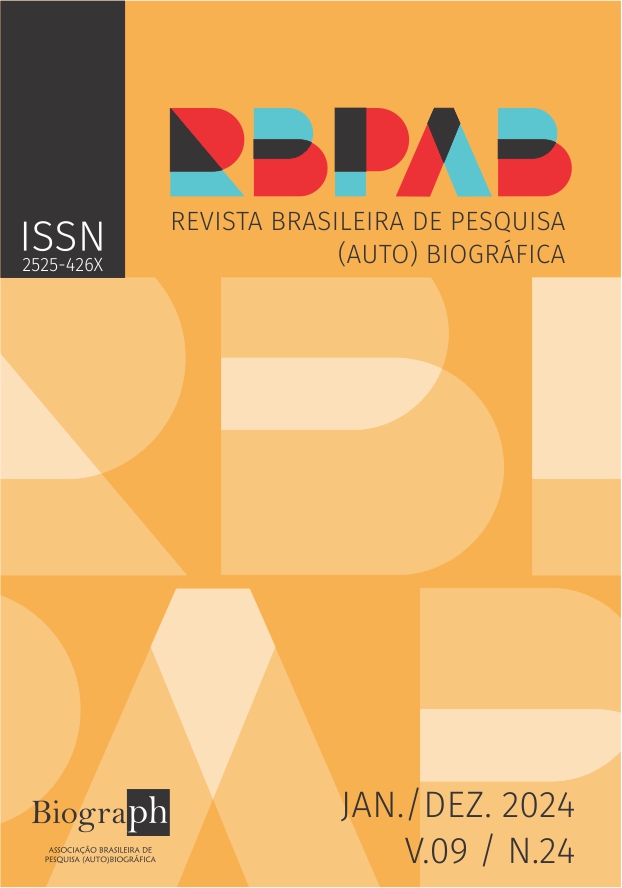Narratives from masters of the oral tradition: knowledge from the vocabulary repertory in an illustrated glossary
DOI:
https://doi.org/10.31892/rbpab2525-426X.2024.v9.n24.e1196Keywords:
História de vida., Mestres da tradição., Repertório vocabular., Glossário ilustrado.Abstract
This study analyzes the life stories of masters of the oral tradition, born in the Maria Quitéria/São José District, rural area of Feira de Santana/Bahia, and also in the municipalities of Poções and Conceição do Coité/Bahia, in order to promote an exchange between traditional knowledge and academic knowledge related to the vocabulary repertoire, produced by these storytellers. From the perspective of the comprehensive paradigm, the reflections presented unfold through the life history method, in which cultural and social facts constitute themselves as texts to be known and understood and the analysis of these as attribution of meanings to lived experiences by subjects in the world. In this way, the narratives of the masters, which convey stories, worldviews and beliefs of a people, were collected through narrative interviews and gave rise to the creation of an illustrated dictionary that materializes a vocabulary repertoire marked by knowledge from popular culture. The results contribute to understanding that oral tradition narratives enunciated by storytellers, socio-historical subjects, culturally situated, are indispensable to the education of adults and children and help to safeguard ancestral knowledge of popular culture, giving them the role of builders of both individual and collective history.
Downloads
References
BÂ, Amadou Hampaté. A Tradição Viva. In: Ki-Zerbo, Joseph. (Org.) História Geral da África. Vol. 1. São Paulo: Ática, Unesco, 2010.
BUSATTO, Cléo. Contar e encantar: pequenos segredos da narrativa. Petrópolis, RJ: Vozes, 2003.
BUSATTO, Cléo. A arte de contar histórias no século XXI: tradição e ciberespaço. 4. ed. Petrópolis: Vozes, 2013.
BAGNO, Marcos. Linguagem. In: FRADE, Isabel Cristina Alves Silva; VAL, Maria da Graça Costa; BREGUNCI, Maria das Graças de Castro. Glossário Ceale de termos de Alfabetização, leitura e escrita par educadores. Belo Horizonte, CEALE/Faculdade de Educação da UFMG. 2014. Disponível em: http://www.ceale.fae.ufmg.br/app/webroot/glossarioceale/verbetes/linguagem. Acesso em: 15 fev. 2024.
BAKHTIN, Mikhail. (Volochínov). Marxismo e filosofia da linguagem: problemas
fundamentais do método sociológico na ciência da linguagem. São Paulo: Hucitec, 1986.
BOSI, Ecléa. Memória e Sociedade: lembranças de velhos. São Paulo: Edusp, 1987.
BOSI, Ecléa. O Tempo Vivo da Memória: ensaios de Psicologia Social. São Paulo: Ateliê Editorial, 2003.
BENJAMIN, Walter. O narrador. In: BENJAMIN Walter; HORKHEIMER Max.; ADORNO Theodor.; HABERMAS Jurgen. Os pensadores. São Paulo: Editor Victor Civita; 1975. p.63-82.
CASCUDO, Luís da Câmara. Contos tradicionais do Brasil. 13. ed. São Paulo: Global, 2004.
JOVCHELOVICH, Sandra; BAUER, Martin. Entrevista Narrativa. In: BAUER, Martin; GASLELL George. (Org.). Pesquisa qualitativa com texto, imagem e som: um manual prático. Petrópolis: Vozes, 2002. p. 90-113.
PINTO, Deise Cristina de Moraes et. alli. Introdução à semântica. Rio de Janeiro: Fundação Cecierj, 2016.
ROCHA, Luís Carlos de Assis. Estruturas morfológicas do Português. São Paulo: Martins Fontes, 2008.
SCHUTZE, Fritz. Pesquisa biográfica e entrevista narrativa. In: WELLER, Wivian; PFAFF, Nicolle. Metodologias da Pesquisa Qualitativa em Educação: teoria e prática. Petrópolis, RJ: Vozes, 2010.
SOUZA, Elizeu. A arte de contar e trocar experiências: reflexões teóricometodológicas sobre histórias de vida em formação. Revista Educação em Questão, Natal, v. 25, n. 11, p. 22-39, jan./abr. 2006.
SOUZA, Elizeu. (Auto)biografia, histórias de vida e práticas de formação. In: NASCIMENTO, Antonio Dias; HETKOWSKI, Tania Maria. (Org.). Memória e formação de professores. Salvador: EDUFBA, 2007. Disponível em: < http://books.scielo.org/id/f5jk5/pdf/nascimento-9788523209186-04.pdf.>. Acesso em:
mar. 2016.
WALSH, Catherine. Introducion - (Re) pensamiento crítico y (de) colonialidad. In: WALSH, Catherine. Pensamiento crítico y matriz (de)colonial. Reflexiones latinoamericanas. Quito: Ediciones Abya-yala, 2005. p. 13-35.
ZUMTHOR, Paul. Performance, recepção, leitura. 1.ed. São Paulo: Cosac Naify, 2014, p. 32-35.













































